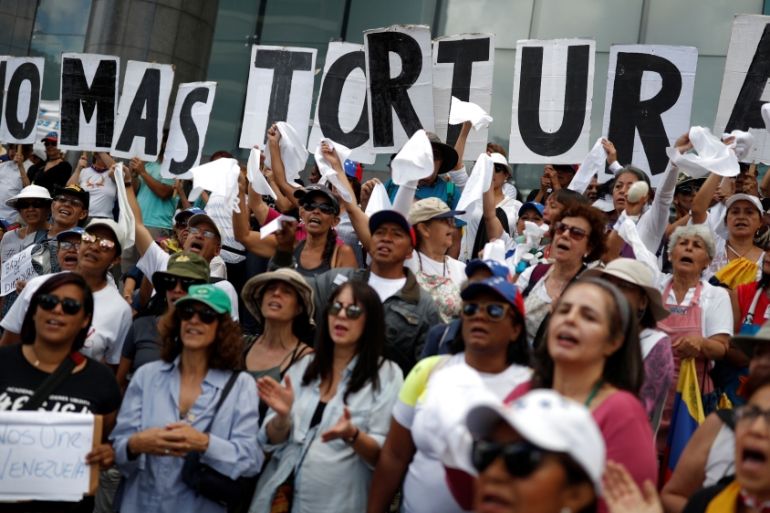EU to hit seven Venezuelan officials with sanctions for torture
The move is the first time in almost a year that the EU has widened its travel bans and asset freezes on Maduro allies.

The European Union will impose economic sanctions on another seven people close to Venezuelan President Nicolas Maduro on Friday, three EU diplomats said, in a decision that may disappoint opposition leaders hoping for sweeping action.
The move is the first time in almost a year that the EU has widened its travel bans and asset freezes to more people close to Maduro. The bloc until now has instead sought to help mediate peace talks with Norway and Latin American countries.
Keep reading
list of 4 itemsArgentina claims to be sheltering Venezuelan opposition leaders in embassy
Faced with an election ban, Venezuela opposition leader names alternate
How Essequibo residents are grappling with fears of a Venezuela takeover
“A decision to add seven new people has been taken,” an EU diplomat said, following a meeting of its ambassadors. Two other diplomats confirmed the sanctions, saying they were linked to torture.
No further details were immediately available but one diplomatic source said the seven Venezuelan officials were deemed responsible for the abduction of Venezuelan naval commandant Rafael Acosta, who died in military custody in June. Relatives say he was tortured to death.
EU ambassadors took their decision on Wednesday and the sanctions were approved on Thursday, the diplomats said, taking the number of Venezuelans under EU “restrictive measures” to 25. The EU imposed an arms embargo in November 2017.
Washington has been urging the EU to take a tougher stance on Maduro, whom France, the United States and several Latin American nations accuse of installing a dictatorship as a political and economic crisis deepens in Venezuela.
US Special Representative for Venezuela, Elliott Abrams, in Brussels this month to meet EU officials, told reporters he had “asked the EU to join us in keeping the pressure” on Maduro’s government because “they don’t want to give up power”.
Under Maduro, Venezuela, which has the world’s largest proven oil reserves but suffers hyperinflation, chronic food shortages and has seen a mass migration to neighbouring countries, has slid towards authoritarianism and a ruined economy.
The United Nations has estimated the number of Venezuelan migrants abroad is currently 4 million.
As with the US, most of the EU has publicly backed Venezuelan opposition politician Juan Guaido as the man to help restore democracy. Maduro is accused of human rights violations and rigging the 2018 presidential election.
However, much of the EU’s diplomacy has been focused on trying to agree a negotiated end to the crisis and move towards a timetable for new presidential elections, so far to no avail.